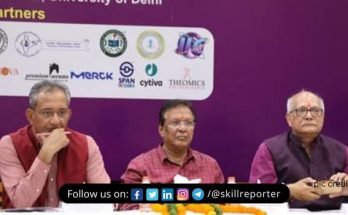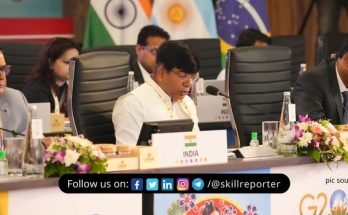The two days’ Global INDIAai Summit 2024 held at Bharat Mandapam, New Delhi on 3-4 July 2024. The opening ceremony was graced by the Union Minister of Electronics and Information Technology, Railways, and Information & Broadcasting, Government of India, Shri Ashwini Vaishnaw, the Vice Minister, Ministry of Internal Affairs and Communications, Government of Japan, Mr. Hiroshi Yoshida, Union Minister of State for Electronics and IT, and Commerce & lndustry, Government of India, Shri Jitin Prasada, Secretary, Ministry of Electronics and Information Technology (MeitY), Shri S Krishnan, President, NASSCOM, Ms. Debjani Ghosh, Vice President, OpenAI, Mr. Srinivas Narayanan and Additional Secretary, MeitY, Shri Abhishek Singh.
The event saw the participation of Global Partnership on Artificial Intelligence (GPAI) experts, delegates, industry and startup veterans, AI practitioners, academicians, students, and officials from Central and State Governments.
Over the course of two days, 12 side sessions were organized, attended by 2,000 global AI experts, policymakers, AI practitioners, industry representatives, startup founders, and academia. These sessions covered topics such as education, skill development, and entrepreneurship as well. More than 10,000 AI enthusiasts participated virtually. Additionally, some sessions took place behind closed doors with delegates and experts from the Global Partnership on Artificial Intelligence (GPAI). The public sessions were live-streamed to facilitate wider participation.
The key highlights and outcomes of the summit are as follows:
- The summit’s registration got oversubscribed. 2,000 AI experts and practitioners attended the sessions physically and the virtual participation crossed 10,000.
- Each session saw in-depth and insightful discussion on several aspects, that included key challenges in implementation, the available western model, India’s unique need in shaping its AI discourse for meeting its domestic demand and for attaining the global AI leadership.
- India set the global discourse by emphasizing the intent of the Government to democratize AI and make it accessible to all.
- Sessions on the key pillars of INDIAai Mission demonstrated India’s planned action and commitment to build an inclusive and robust AI ecosystem in the country and lead the global AI innovation.
- The Global South countries acknowledged and appreciated the role of India to give voice to them at the global AI forum and bridge the gap with Global North.
- The convening of Collaborative AI on Global Partnership (CAIGP) brought together GPAI members, AI experts and industry representatives to identify mechanisms to overcome the global AI divide.
- The OECD – OCDE and GPAI announced a new integrated partnership on AI at New Delhi.
- The GPAI members came to a consensus about the future vision of Global Partnership on Artificial Intelligence. Some of the key points included in the future vision are as follows:
- Recognise the transformative potential of AI in shaping the future of our societies and economies
- Acknowledge the emerging risks and challenges posed by AI systems
- Share a commitment to fostering trustworthy and human-centric AI
- Reaffirm the collective commitment to the OECD Recommendation on AI and the UNESCO Recommendation on the Ethics of AI
- Recall that the GPAI has been a unique initiative for global multi stakeholder cooperation on AI
- Recognise the New Delhi 2023 GPAI Ministerial Declaration, where GPAI’s unique and independent identity is emphasized as a nodal initiative that plays a key role in global cooperation on AI innovation and governance.
Overall, the summit led to in-depth deliberations and resulted in deep insights on several implementation aspects of INDIAai Mission, that inter-alia include
- Multi-LLM models to meet the diverse need of India,
- Platformization and standardization of AI ready data
- Partner ecosystem and multi-stakeholder approach to implement INDIAai Mission from technology, policy, framework, research, industrial, startup, ethical, youth, business, and academic perspectives, and
- weaving together the strength of India viz. its skilled & talent ecosystem, demand ecosystem, researcher, startup and industrial ecosystems.
Shri Jitin Prasada stated that India stands ready at the forefront of global AI innovation. Our commitment is to promote an inclusive and robust AI ecosystem. It is evident from highest AI skill penetration attained by India globally and substantial investments made in nurturing AI startups in the country. He stressed on the vision of INDIAai mission that is to make AI in India and AI work for India. He emphasized on the need to work collaboratively to develop solutions for AI to solve problems and challenges in key sectors like health care, agriculture, education. He expressed that India’s DPI are sought after by the other nations for replications. India’s AI solutions are envisaged to have the same future.
Mr. Abhishek Singh in the opening ceremony briefly explained the INDIAai Mission and shared that 12 sessions are planned over two days to cover in depth the 7 pillars of the mission and idea is to deliberate on the issues and discuss the way forward from multidimensional perspectives. He also apprised that India, as the chair of GPAI, is working closely with GPAI member States, OECD and the global south for coming up with the future vision of GPAI.
From The Sessions:
Session: India’s Infrastructure Readiness for AI
The keynote was given by Mr. Thomas Zacharia, SVP, AMD. The session included distinguished panelists, namely Mr. Vishal Dhupar, MD, NVIDIA, Col. A.K Nath (Retd.), ED, C-DAC, Ms. Rohini Srivathsa, CTO, Microsoft, Mr. Sambit Sahu, SVP, Krutrim-Ola, Mr. Anil Nanduri, VP, Intel, Mr. Ranganath Sadasiv, CTO, HPE, Mr. Gaurav Aggarwal, VP-AI, Reliance Jio, Mr. Sunil Gupta, MD & CEO-Yotta Data Services, Mr. Tanuj Bhojwani, Head, People+AI, Mr. Hirdey Vikram, SVP, Netweb Technologies and Mr. Amlan Mohanty, Research Fellow, Carnegie India (Moderator). The sessions covered sovereignty, compliance, digital autonomy, more computational resources, cost-effective GPU services, investment, PARAM series supercomputers, skilled resources, and access to computing,
Session: IndiaAI: Ensuring Safety, Trust, and Governance in the AI Age
The keynote was given by Shri. S. Krishnan, Secretary, MeitY. The session included distinguished panelists, namely Dr. Balaraman Ravindran, Professor, IIT Madras, Mr. Arjun Goswami, Director, Public Policy, Cyril Amarchand Mangaldas, Shri. Mahaveer Singhvi, JS, MEA, Mr. Jibu Elias, Country Lead for India, Mozilla (Moderator), Mr Tim Curtis, Director, UNESCO, Mr Sharad Sharma, Co-founder, iSPIRT, Shri Deepak Goel, GC-CLD, MeitY, and Dr. Urvashi Aneja, Director, Digital Futures Lab. The sessions covered sovereignty, compliance, digital autonomy, more computational resources, cost-effective GPU services, investment, PARAM series supercomputers, skilled resources, and access to computing, The session covered the legal and security issues, global response to responsible use of AI, open-source technologies, publically available datasets, etc.
Session: Collaborative AI on Global Partnership (CAIGP)
The keynote was given by Mr Rohit Rathish, JS (DPA – III), MEA. The session included distinguished panelists, namely Prof. Sachin Chaturvedi, DG, RIS(Moderator), Shri Sushil Pal, JS-ICD, MeitY, Mr. Vishal Dhupar, MD, NVIDIA, Ms. Annabel Lee, Director, AWS, Mr. Jerry Sheehan, Director, OECD, Dr. Kalika Bali, Pr. Researcher, Microsoft, Rudra Chaudhuri, Director, Carnegie India, Ms. Debjani Ghosh, President, NASSCOM, Ms. Jaya Jagdish, Country Head, AMD India, Anirudh Suri, Managing Partner, India Internet Fund, Mr. Mathieu Marcotte, Director, CEIMIA, and Dr. Subi Chaturvedi, Global SVP, Inmobi. The sessions covered sovereignty, compliance, digital autonomy, more computational resources, cost-effective GPU services, investment, PARAM series supercomputers, skilled resources, and access to computing, The session covered the disparities between the Global North and South, global governance mechanisms, democratizing AI through DPI, AI standards, among others.
Session: IndiaAI: Empowering Talent through AI Education & Skilling
The session began with a keynote by Prof. T G Sitharam, Chairman, AICTE. The session included distinguished panelists, namely Ms. Shweta Khurana, Sr. Director, Intel (Moderator), Mr. Amit Singhee, CTO, IBM, Ms. Joyce Poan, Chief of Education, UNESCO, Mr. Raghav Gupta, Managing Director, India & Asia-Pacific, Coursera, Mr. Prakash Kumar, CEO, Wadhwani Government Digital Transformation, and Mr. Anil Sahasrabudhe, Chairman, NETF.
The discussion covered India’s unique needs and collaboration among industry, public sector and society to build an AI-ready generation in India, emphasizing human intelligence to thrive in an AI-driven world. The need for mutual recognition of certifications was also discussed to ensure the effectiveness of training and skill development initiatives across different regions and countries. The importance of curated and age-appropriate AI learning environments was also covered.
Session: IndiaAI: From Seed to Scale- Empowering India’s Startup Ecosystem
The keynote was given by Shri. Amitabh Kant, G20 Sherpa, GoI. The session included distinguished panelists, namely Ms. Chandra R. Srikanth, Deputy Executive Editor, Moneycontrol (Moderator), Mr. Rajan Anandan, MD, Peak XV Partners and Surge, Mr. Raman Ramanathan, Former Mission Director, Atal Innovation Mission, Mr. Mayuresh Raut, Co-Founder and Managing Partner, SeaFund, Mr. Abhishek Upperwal, Founder & CEO, SoketLabs, Mr. Abhinav Aggarwal, Co-founder & CEO, Fluid AI, and Mr. Jayesh Ranjan, Special Chief Secretary, ITE&C and Industries and Commerce Department, Government of Telangana.
The discussion highlighted the fact that INDIAai Mission has been approved with an outlay of ₹10,372 crore and out of this, ₹2,000 crore would be utilized towards supporting the Indian startup ecosystem to develop indigenous AI based solutions.
The support would also include resolution of issues such as compute, dataset and skills and access to GPU Infrastructure would be made available at subsidized rate. Insights revealed that India has a competitive advantage in AI owing to skills, market and demand. For entrepreneurs, the value creation and return on investment over and above cost will be the key catalyst. INDIAai Mission can lower the cost of innovation and indigenous development.




